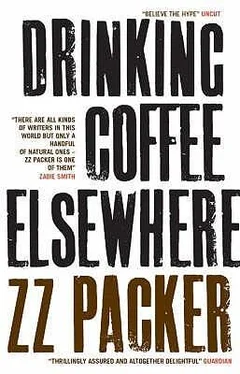She stared. Her hands clapped his, preventing him from playing further. For a moment, she was breathless. He looked at her, suddenly seeming to comprehend what he’d just said, that the Lord had actually spoken to him. For a minute, they sat there, both overjoyed at what the Lord had done, but then he had to go ruin it. He burst out laughing his biggest, most sinful laugh yet.
“Awww!” he cried, doubled over, and then flopped backward onto his hospital bed. Then he closed his eyes, laughing without sound.
She stood up, chest heaving, wondering why she even bothered with him.
“Clareese,” he said, trying to clear his voice of any leftover laughter, “don’t go.” He looked at her with pleading eyes, then patted the space beside him on the bed.
She looked around the room for some cue. Whenever she needed an answer, she relied on some sign from the Lord; a fresh beam of sunlight through the window, the hands of a clock folded in prayer, or the flush of a commode. These were signs that whatever she was thinking of doing was right. If there was a storm cloud, or something in her path, then that was a bad sign. But nothing in the room gave her any indication whether she should stay and witness to Mr. Sanders, or go.
“What, Mr. Sanders, do you want from me? It’s my day off. I decided to come by and offer you an invitation to my church because God has given you a gift. A musical gift.” She dug into her purse, then pulled out a pocket-sized Bible. “But I’ll leave you with this. If you need to find us — our church — the name and number is printed inside.”
He took the Bible with a little smile, turning it over, then flipping through it, as if some money might be tucked away inside. “Seriously, though,” he’d said, “let me ask you a question that’s gonna seem dumb. Childish. Now, I want you to think long and hard about it. Why the hell’s there so much suffering in the world if God’s doing his job? I mean, look at me. Take old Toomey, too. We done anything that bad to deserve all this put on us?”
She sighed. “Because of people, that’s why. Not God. It’s people who allow suffering, people who create it. Perpetrate it.”
“Maybe that explains Hitler and all them others, but I’m talking about—” He gestured at the room, the hospital in general.
Clareese tried to see what he saw when he looked at the room. At one time, the white and pale green walls of the hospital rooms had given her solace; the way everything was clean, clean, clean; the many patients that had been in each room, some nice, some dying, some willing to accept the Lord. But most, like Mr. Toomey, cast the Lord aside like wilted lettuce, and now the clean hospital room was just a reminder of the emptiness, the barrenness, of her patients’ souls. Cleophus Sanders was just another patient who disrespected the Lord.
“Why does He allow natural disasters to kill people?” Clareese said, knowing that her voice was raised louder than what she meant it to be. “Why are little children born to get some rare blood disease and die? Why,” she yelled, waving her arms, “does a crane fall on your leg and smash it? I don’t know, Mr. Sanders. And I don’t like it. But I’ll say this! No one has a right to live! The only right we have is to die. That’s it! If you get plucked out of the universe and given a chance to become a life, that’s more than not having become anything at all, and for that, Mr. Sanders, you should be grateful!”
She had not known where this last bit had come from, and, she could tell, neither had he, but she could hear the other nurses coming down the hall to see who was yelling, and though Cleophus Sanders looked to have more pity on his face than true belief, he had come after her when she turned to leave. She’d heard the clatter of him gathering his crutches, and even when she heard the meaty weight of him slam onto the floor, she did not turn back.
THEN there it was. Pastor Everett’s silly motion of cupping his hand to his ear, like he was eavesdropping on the choir, his signal that he was waiting for Sister Clareese to sing her solo, waiting to hear the voice that would send the congregation shouting, “Thank you, Jesus, Blessed Savior!”
How could she do it? She thought of Cleophus on the floor and felt ashamed. She hadn’t seen him since; her yelling had been brought to the attention of the administrators, and although the hospital was understaffed, the administration had suggested that she not return until next week. They handed her the card of the staff psychiatrist. She had not told anyone at church what had happened. Not even her aunt Alma.
She didn’t want to sing. Didn’t feel like it, but, she thought, I will freely sacrifice myself unto Thee: I will praise Thy name, O Lord, for it is good. Usually thinking of a scripture would give her strength, but this time it just made her realize how much strength she was always needing.
She didn’t want to, but she’d do it. She’d sing a stupid solo part — the Waterfall, they called it — not even something she’d invented or planned to do who knows how many years ago when she’d had to sneeze her brains out, but oh no, she’d tried holding it in, and when she had to sing her solo, those years ago, her near-sneeze had made the words come out tumbling in a series of staccato notes that were almost fluid, and ever since then, she’d had to sing all solos that way, it was expected of her, everyone loved it, it was her trademark. She sang: “All-hall other-her her grooouund — is sink-king sand!”
The congregation applauded.
“SAINTS,” the Pastor said, winding down, “you know this world will soon be over ! Jesus will come back to this tired, sorry Earth in a moment and a twinkling of an eye ! So you can’t use call-waiting on the Lord! Jeeee-zus, my friends, does not accept conference calls! You are Children of God! You need to PRAY! Put down your phone! Say goodbye to AT&T! You cannot go in God’s direction, without a little— genuflection !”
The congregation went wild, clapping and banging tambourines, whirling in the aisles. But the choir remained standing in case Pastor Everett wanted another song. For the first time, Clareese found that her monthly troubles had settled down. And now that she had the wherewithal to concentrate, she couldn’t. Her cross-eyes wouldn’t keep steady, they roamed like the wheels of a defective shopping cart, and from one roving eye she saw her aunt Alma, waving her arms as though listening to leftover strains of Clareese’s solo.
What would she do? She didn’t know if she’d still have her job when she went back on Monday, didn’t know what the staff psychiatrist would try to pry out of her. More important, she didn’t know what her aunt Alma would do without the special medical referrals Clareese could get her. What was a Sister to do?
Clareese’s gaze must have found him just a moment after everyone else’s had. A stranger at the far end of the aisle, standing directly opposite Pastor Everett as though about to engage him in a duel. There was Cleophus Sanders with his crutches, the right leg of his pinstriped pants hollow, wagging after him. Over his shoulder was a strap, attached to which was his guitar. Even Deacon McCreedy was looking.
What in heaven’s name was Cleophus doing here? To bring his soul to salvation? To ridicule her? For another argument? Perhaps the doctors had told him he did not need the operation after all, and Cleophus was keeping his end of the deal with God. But he didn’t seem like the type to keep promises. She saw his eyes search the congregation, and when he saw her, they locked eyes as if he had come to claim her. He did not come to get Saved, didn’t care about his soul in that way, all he cared about was—
Читать дальше












